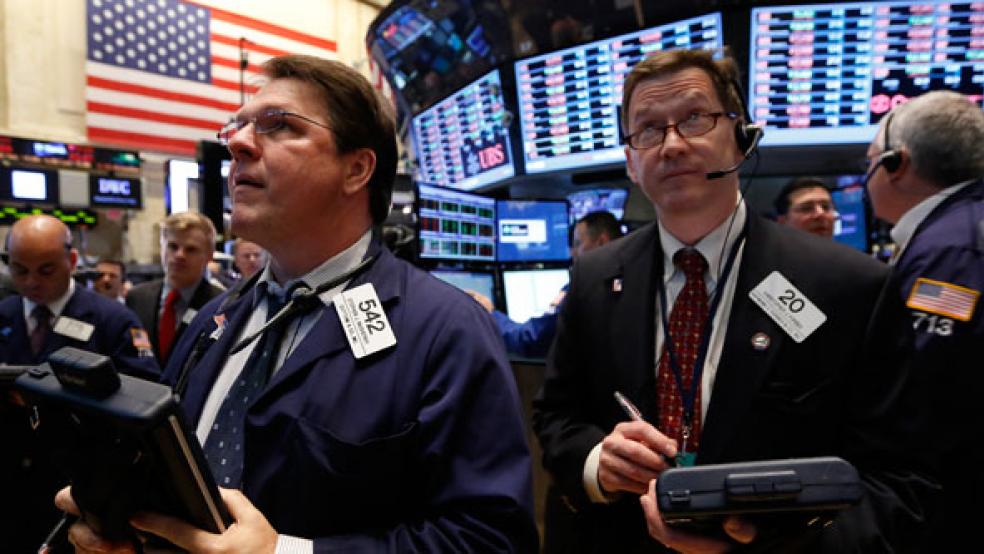Earnings and economic data could corral Wall Street's record-setting bull run, but stock strategists agree the market trend for now is higher.
The week ahead is jam-packed with earnings and economic news, the most important of which is the delayed September jobs report, now to be released Tuesday. Other data on import and export prices, held back by the government shutdown, will be released Wednesday. Then there's the earnings gusher, with McDonald's, Microsoft, Amazon.com, Boeing and Caterpillar among the more than 140 S&P 500 companies reporting.
RELATED: MEREDITH WHITNEY AND THE PROBLEM WITH WALL STREET PUNDITS
Economic data will be key in the next several weeks, as economists weigh the impact of the 16-day government shutdown on the consumer, business confidence, and economic growth.
"An increasing number of people thought the economy was going to start hitting critical mass and that was all derailed by this thing," said Richard Bernstein, CEO of Richard Bernstein Capital Management. "In the next month, we're going to sort through the data and find out what's going on. That could add a little volatility. I think the underlying trend is still positive, but it's not like we have a booming economy…This is going to keep the Fed on the sidelines a little longer."
The September jobs report is not expected to reveal anything about the shutdow, but it is the final employment report the Fed will review before it meets Oct. 29 and 30. The Fed is not expected to take action to taper back its bond buying, now that the economic situation has become murkier. Many economists say the earliest it would move is December, but some say it's more likely it will now wait until early next year.
RELATED: QE3: WHAT EXACTLY IS IT? AN EXPLAINER
Mark Zandi, chief economist at Moody's Analytics, expects to see 150,000 jobs added in September and an unemployment rate 0.1 percent lower at 7.2 percent. According to Thomson Reuters, the consensus among economists is for 180,000 jobs added and a 7.3 percent unemployment rate.
He expects that the government shutdown dented growth by about half a percent in the fourth quarter, and he now expects to see a growth rate of 2 percent. "I think the political uncertainty is having an impact on business and decision making. I can't imagine that the Fed would taper (bond purchases)," said Zandi. "I think that doesn't begin until early next year, probably March at this point."
Chicago Fed President Charles Evans Friday waved markets off the idea that the Fed could taper back its $85 billion bond buying at its October meeting. He said, in a speech, that not enough data are available. Unlike the past week, there are no Fed speeches on the calendar in the coming week, but Evans will speak with CNBC's Steve Liesman Monday at 8 a.m. ET on "Squawk Box."
RELATED: S&P 500 IN RELIEF RALLY; WILL MORE WORRIES KICK IN?
Stocks ended the past week on an upbeat note, with the S&P 500 and Russell 2000 at new highs, and the Dow up 1 percent for the week at 15,399, but still about 300 points away from its all-time high. The S&P was up 2.4 percent for the week, finishing at 1744, while the Nasdaq, boosted by Google's big jump, scored a 3.2 percent gain to 3914, a 13-year high, and its third best weekly performance this year.
The market was already moving higher ahead of Wednesday's breakthrough between the House and Senate on a compromise bill to reopen the government and raise the debt ceiling. But it throttled even higher after news of the deal and kept going into the end of the week, defying expectations it would sell off on the news.
Markets instead immediately shifted focus to the idea that the shutdown hurt the economy and probably means the Fed will keep its quantitative easing program going longer than expected, a positive for stocks and a negative for the dollar. Though earnings are mixed, analysts say they have been good enough to keep the rally going.
"I've never seen such a clean-cut technical move. If you had turned the TV off and watched the action, you never would have known there was a care in the world …The market ignored the negativity and embraced the volatility which helped lead this leg to all-time highs," said Scott Redler of T3Live.com, who follows the market's short-term technicals. "Traders were looking overseas to see what foreign markets thought of the potentially catastrophic default but they were the ones that had the confidence not to get scared out of positions."
As a result, shorts covered positions, helping add more steam to the market's gains. "From here, the S&P is just getting to the overbought territory. We closed at 1745ish, just at that new resistance measured range of 1740 to 1760 I talked about a few weeks ago," he said. "I don't think it ends here but I don't think next week we're going to see the same type of gains we had this week…we could pierce the 1755 to 1760 area and that would probably cap this trade right now … I think we're going to grind higher but the way money managers are going to chase performance is going to be selective names."
Dan Suzuki, Bank of America Merrill Lynch U.S. equity strategist, said sentiment has also not improved so much that it has become a negative for the market though his year-end target for the S&P is close, at 1750. "If you think about it fundamentally, not much has really changed. Valuations have gone up a little but I think they're pretty reasonable. Sentiment has improved but it's low relative to history and we still think we're going to see acceleration in growth in the next couple of quarters, not just here in the U.S. but in other major regions," said Suzuki.
Suzuki said even with the mixed earnings picture, there are positives. "In the first big week of earnings, you had more beats so actually estimates for the quarter bottomed and started to go up. You're seeing estimates rise as a function of companies beating, and not only are they beating on earnings but you're seeing better trends in terms of top line growth as well," he said. "As of now, earnings are expected to grow 3.4 percent for the quarter year-over-year, and sales growth is 2.1 percent."
"You're seeing every sector except energy with positive year-over-year earnings growth, and every sector except for financials and energy expected to see positive sales growth," he said. Suzuki said the fact that Europe has become a positive, instead of an earnings drag is also important for the market.
Wells Capital Management chief investment strategist James Paulsen said that turn in Europe, coupled with improvement in China could be a strong positive for stocks. "I believe the biggest thing for the economy is the international and domestic synchronization, which is pretty profound and the best it's been since the recovery," he said. "When was the last time we had positive growth going on in the United States, Japan and the emerging world at the same time. I think that's going to be a confidence booster. It might even get CEOs looking at their capital plans. What I'm conflicted about is the short term. Stocks may have to go down again before we go up."
Paulsen said the market could pull back, before going higher, especially since some of the upcoming economic data could be rocky.
"I think you ought to prepare for another leg to the upside and get positioned for that. I'm not totally convinced we don't have to have a little gut check first. My gut tells me we will, and my models tell me we won't," he said. "Sentiment is up with our models but not excessively. Momentum has weakened a little, but it's going to go up. Economic momentum is still there and favorable. Policy momentum is favorable. Technicals are favorable. The underlying leadership is good, with small caps, cyclicals leading. It's stuff that tells me not to get too negative."
This article originally appeared in CNBC.
Read more at CNBC:
Tepper: No Taper for a 'Long Time'
Game Plan: 10 Earnings Cramer Wouldn't Miss
What Follows This Congressional Deal?





